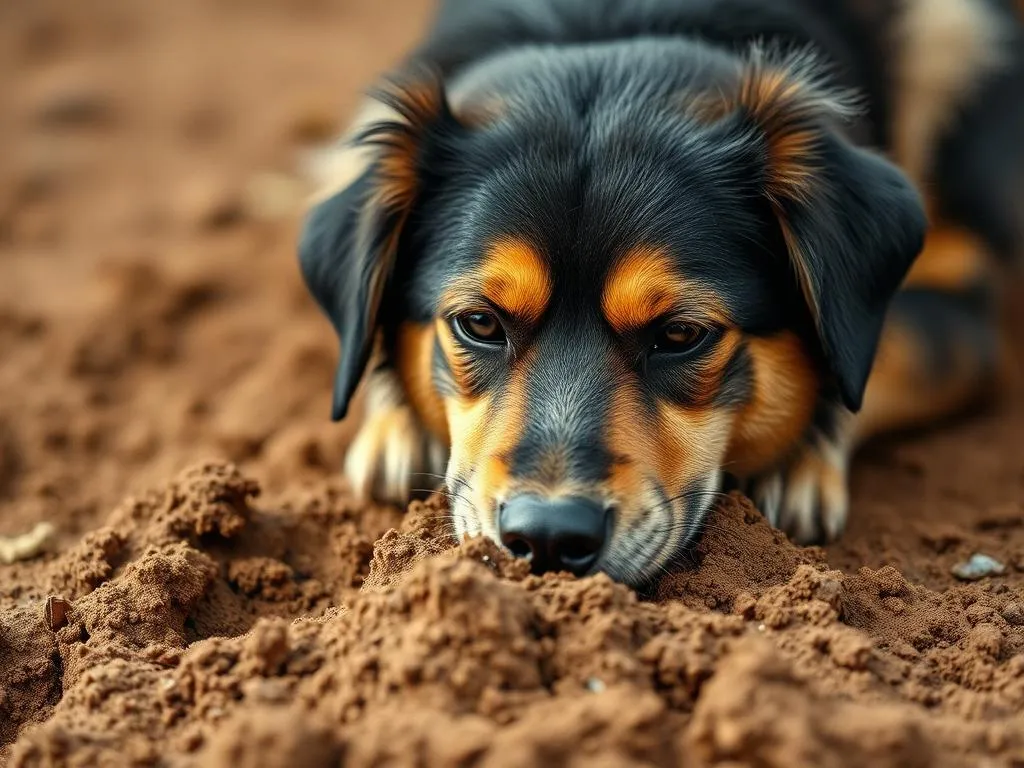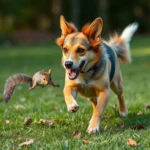
Introduction
As dog owners, we frequently observe our furry friends engaging in a variety of behaviors that leave us puzzled. One particularly perplexing behavior is when dogs eat dirt. Understanding why dogs eat dirt is crucial for pet owners, as it can be indicative of underlying issues or simply a quirky habit. Despite common misconceptions that dirt-eating is merely a sign of mischief or a lack of training, it often stems from deeper needs or instincts.
In this article, we will explore the various reasons behind this behavior, discuss its potential health impacts, and offer strategies for addressing it. By understanding the motivations behind your dog’s actions, you can ensure their well-being and happiness.
Understanding Dog Behavior
Definition of Dog Behavior
Dog behavior encompasses the range of actions and reactions exhibited by dogs in response to their environment, experiences, and instincts. This behavior is influenced by a combination of factors, including genetics, socialization, and environmental conditions.
Factors Influencing Dog Behavior
-
Genetics: Just like humans, dogs inherit traits from their parents. Certain breeds may have innate tendencies that influence their behavior, including dietary habits.
-
Environment: The setting in which a dog is raised plays a significant role in shaping its behavior. Dogs that are exposed to diverse stimuli may develop different responses compared to those in a more controlled environment.
-
Socialization: How a dog interacts with other animals and humans can greatly affect its behavior. Early socialization can lead to a well-adjusted pet, while lack of exposure can lead to anxiety and behavioral issues.
Overview of Typical Dog Behaviors and Their Meanings
Understanding typical dog behaviors can help clarify why your dog might engage in unusual actions like eating dirt. For instance, digging and chewing are common exploratory behaviors that dogs exhibit. These actions can signify curiosity, boredom, or even stress.
Common Reasons Why Dogs Eat Dirt
Nutritional Deficiencies
One of the most common reasons why dogs eat dirt is related to nutritional deficiencies. If a dog’s diet lacks essential nutrients, they may instinctively seek out alternative sources. Dogs may be drawn to dirt in search of minerals like iron or calcium.
- Signs of Specific Deficiencies: Look for behaviors such as lethargy, poor coat quality, or unusual cravings. If you suspect a deficiency, consult with your veterinarian to assess your dog’s dietary needs.
Instinctual Behavior
Dogs are descendants of wild animals that foraged for food in their natural environments. Eating dirt may be an instinctual behavior that harks back to their ancestors, who would consume soil as part of their diet.
- Connection to Foraging and Exploration: This instinctual behavior can be linked to a dog’s desire to explore and discover new tastes and textures. In the wild, dogs would often dig in the dirt to find food.
Curiosity and Exploration
Dogs are naturally curious creatures. They use their mouths to explore their surroundings, which can lead to dirt consumption.
- Behavioral Examples of Curiosity-Driven Actions: Dogs often chew on various objects, dig holes, or sniff around, demonstrating their need to understand their environment. Eating dirt may be a manifestation of this exploratory behavior.
Boredom and Anxiety
Boredom can lead to unwanted behaviors, including dirt eating. Dogs that lack sufficient physical and mental stimulation may resort to digging and chewing on non-food items.
- Signs of Boredom in Dogs: Common signs include excessive barking, destructive behavior, and restlessness. If your dog is frequently eating dirt, it may be a signal that they are bored or anxious.
Medical Issues
Sometimes, dirt-eating behavior can be a symptom of underlying medical issues. Conditions such as gastrointestinal problems, parasites, or pica (a condition characterized by eating non-food items) can lead dogs to consume dirt.
- When to Consult a Veterinarian: If you notice changes in your dog’s appetite, weight, or energy levels, it’s important to seek veterinary advice to rule out any potential health concerns.
The Impact of Dirt Eating on Dog Health
Potential Risks Associated with Eating Dirt
While some dogs may occasionally eat dirt without immediate consequences, habitual dirt consumption can pose significant health risks.
-
Parasites and Pathogens: Dirt can harbor harmful organisms that may lead to infections or parasitic infestations. Dogs that eat dirt are at a higher risk of ingesting harmful bacteria or parasites.
-
Gastrointestinal Blockages: Consuming large amounts of dirt can result in blockages in the digestive tract, leading to serious health issues that may require surgical intervention.
Signs of Health Issues Related to Dirt Consumption
Monitoring your dog for signs of health issues associated with dirt eating is crucial. Common symptoms to watch for include:
-
Vomiting: Frequent vomiting may indicate a problem with the digestive system.
-
Diarrhea: Loose stools can be a sign of gastrointestinal distress.
-
Lethargy: A noticeable decrease in energy or enthusiasm may suggest an underlying health issue.
Long-Term Effects of Habitual Dirt Eating
If left unaddressed, habitual dirt eating can lead to chronic health problems. Long-term exposure to harmful pathogens or gastrointestinal blockages can result in severe complications, including malnutrition or organ damage.
How to Address Dirt Eating Behavior
Assessing Your Dog’s Diet
A well-balanced diet is crucial for your dog’s overall health. If you suspect that nutritional deficiencies are driving your dog to eat dirt, it’s vital to evaluate their diet.
-
Importance of a Balanced Diet: Ensure that your dog is receiving all the necessary nutrients. High-quality commercial dog food is typically formulated to meet these needs.
-
Consultation with a Veterinarian for Dietary Adjustments: If you’re unsure about your dog’s nutritional requirements, consulting a veterinarian can provide tailored dietary recommendations.
Environmental Enrichment
Dogs need mental and physical stimulation to stay happy and healthy. Providing environmental enrichment can help prevent boredom and anxiety, reducing the likelihood of dirt eating.
-
Ideas for Keeping Dogs Engaged and Entertained: Regular walks, playtime, and interactive games can help keep your dog occupied.
-
Interactive Toys and Activities: Puzzle toys, treat-dispensing toys, and agility courses can provide engaging challenges for your dog, diverting their attention from dirt.
Training and Behavioral Modification
If your dog’s dirt-eating behavior is persistent, implementing training techniques may be necessary.
-
Techniques to Discourage Unwanted Behaviors: Redirecting your dog’s behavior when they start to eat dirt can be effective. Use commands like “leave it” and reinforce positive behaviors with treats or praise.
-
Positive Reinforcement Strategies: Reward your dog for engaging in appropriate behaviors, which can help reinforce good habits and reduce dirt eating.
When to Seek Professional Help
In some cases, dirt eating may require professional intervention. Recognizing the signs that your dog needs help is crucial for their well-being.
-
Identifying Signs That Professional Intervention is Needed: If your dog’s dirt consumption is excessive or accompanied by health issues, it’s time to consult a professional.
-
Types of Professionals Who Can Assist: Consider reaching out to dog trainers, veterinary behaviorists, or animal psychologists who can provide tailored strategies to address the behavior.
Conclusion
In summary, there are numerous reasons why dogs eat dirt, ranging from nutritional deficiencies to instinctual behaviors and boredom. Understanding these motivations is crucial for any dog owner looking to promote their pet’s health and happiness. By monitoring your dog’s behavior and addressing any underlying issues, you can help prevent this behavior from becoming a health concern.
If you notice your dog engaging in dirt-eating behavior, take the time to assess their diet, provide environmental enrichment, and consider training strategies. Remember, it’s always best to consult with a veterinarian if you have concerns about your dog’s health or behavior. By taking proactive steps, you can ensure your dog leads a happy, healthy life.
FAQs
What should I do if my dog eats dirt?
If your dog eats dirt, monitor them closely for any signs of health issues. Ensure they have a balanced diet and provide adequate stimulation. If the behavior persists or if you notice any concerning symptoms, consult your veterinarian.
Can eating dirt be harmful to dogs?
Yes, eating dirt can be harmful to dogs. It may expose them to parasites, pathogens, and gastrointestinal blockages. Monitor your dog’s behavior and health closely.
How can I tell if my dog is eating dirt out of boredom?
Signs of boredom in dogs can include excessive barking, destructive behavior, and restlessness. If your dog frequently engages in dirt eating and shows these signs, it may be a signal that they need more mental and physical stimulation.









